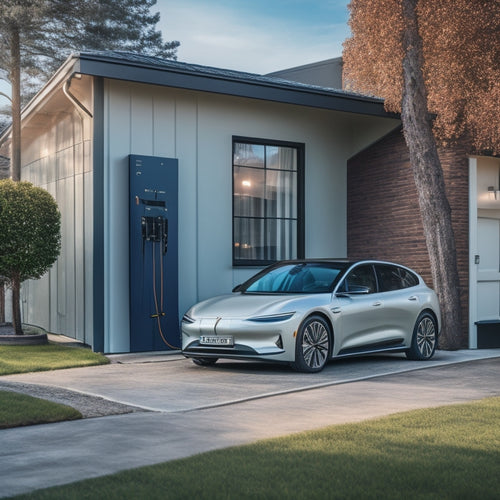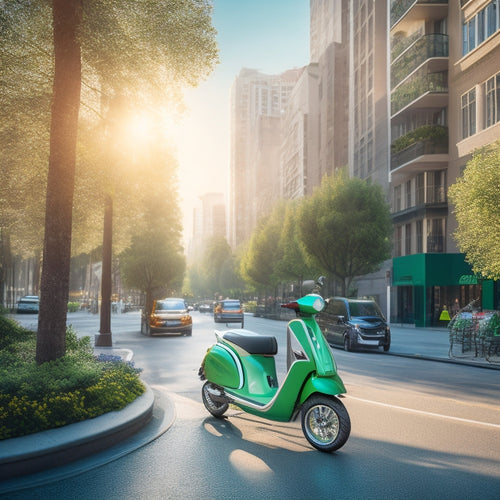
What Are Today's Best Solar Panels
Share
You're looking for the best solar panels on the market today. Top brands like Trina, Canadian Solar, and Hanwha Q CELLS offer high-quality products with impressive warranties. If you're looking for maximum energy output, high-efficiency panels from SunPower and Panasonic are worth evaluating. Budget-friendly options are also available through power purchase agreements, solar loans, and community solar programs. For homes, top-rated panels include the SunPower X-Series and Panasonic HIT-240. As you investigate your options, you'll want to take into account durability, design, and emerging trends like bifacial technology - and there's more to uncover that can help you make an informed decision.
Key Takeaways
- Established brands like Trina, Canadian Solar, and Hanwha Q CELLS offer high-quality products with a commitment to solar innovations and significant R&D investment.
- High-efficiency solar panels like SunPower X-Series and Panasonic HIT-240 maximize energy output and power generation, ideal for limited roof space.
- Durable solar panels with weather-resistant materials, heavy-duty frames, and protective coatings ensure longevity and performance in outdoor installations.
- Long warranties from reputable manufacturers like SunPower and Panasonic provide protection against defects and performance issues, often extending beyond 25 years.
- Emerging trends in solar technology, such as bifacial panels and floating solar installations, can increase energy production and optimize performance in various environments.
Top Solar Panel Brands
When shopping for the best solar panels, one essential consideration is the brand. You want a manufacturer that's committed to solar panel innovations, ensuring you get the most out of your sustainable energy investment.
Established brands like Trina, Canadian Solar, and Hanwha Q CELLS have built a reputation for supplying high-quality products. They've invested heavily in research and development, resulting in more efficient panels that generate more power per hour of sunlight.
These top brands also offer a range of products to cater to different needs and budgets. Whether you're looking for a budget-friendly option or a premium panel with advanced features, you'll find a suitable option from these manufacturers.
Additionally, they provide extensive warranties, giving you peace of mind and protecting your investment. By choosing a reputable brand, you can rest assured that your solar panel system will provide sustainable energy for years to come.
High-Efficiency Solar Panels
High-efficiency solar panels are a key consideration for maximizing your energy output. You want to get the most power possible from your solar panel system, and that's where high-efficiency materials and innovative designs come in. These advanced technologies allow you to generate more electricity per hour of sunlight, making them ideal for homes and businesses with limited roof space.
Here's a comparison of some top high-efficiency solar panels:
| Panel Model | Efficiency Rating | Power Output (W) |
|---|---|---|
| SunPower X-Series | 22.8% | 440 |
| Panasonic HIT-240 | 21.8% | 330 |
| LG NeON 2 | 20.5% | 370 |
| Trina Solar TALLMAX | 20.3% | 360 |
When selecting high-efficiency solar panels, consider factors like your available roof space, energy needs, and budget. While these premium panels may come at a higher upfront cost, they can provide long-term savings and a faster return on investment. By choosing the right high-efficiency solar panels for your system, you can enjoy maximum energy output and a significant reduction in your energy bills.
Budget-Friendly Solar Options
Since you're looking for a more affordable way to employ solar energy, budget-friendly solar options are worth investigating.
You'll be pleased to know that there are various ways to reduce the upfront costs of solar panels without sacrificing their performance. One approach is to evaluate affordable financing options, such as power purchase agreements (PPAs) or solar loans, which can spread the cost over several years.
Additionally, community solar programs allow you to share the benefits of solar energy with your neighbors, reducing the individual cost burden.
Another budget-friendly option is to opt for slightly less efficient panels, which can still provide a significant portion of your energy needs while being more affordable.
You can also examine local and state incentives, such as tax credits or rebates, to further reduce the cost of installation.
Best Solar Panels for Homes
Your home's rooftop is prime real estate for utilizing the sun's energy, and selecting the right solar panels is critical to maximizing your energy independence. When it comes to solar panel installation, you want to guarantee you're getting the most out of your investment. Here are some top-rated solar panels for homes that can help you achieve significant solar energy savings:
| Panel Model | Efficiency | Wattage |
|---|---|---|
| SunPower X-Series | 22.8% | 440W |
| Panasonic HIT-240 | 21.8% | 330W |
| Tesla Solar Roof | 21.5% | 325W |
| LG NeON 2 | 20.5% | 395W |
| Trina Tallmax M10 | 20.3% | 390W |
These solar panels offer high efficiency ratings, which means they can generate more power per hour of sunlight. With a higher wattage output, you'll be able to power more of your home's appliances and reduce your reliance on the grid. By choosing the right solar panels for your home, you can enjoy significant solar energy savings and a faster return on investment.
Commercial Solar Panel Solutions
When you're looking to power your commercial property with solar energy, you need high-efficiency solar panels that can maximize your energy output.
You'll want to contemplate cost-effective energy solutions that can help you reduce your energy bills and increase your bottom line.
Solar Panel Efficiency
Commercial solar panel solutions rely heavily on the efficiency of their solar panels, as it directly impacts the amount of electricity generated.
You need to understand that solar panel efficiency refers to the percentage of sunlight that's converted into electricity. Currently, the most efficient solar panels on the market have efficiencies ranging from 20% to 22%. These high-efficiency panels are made from advanced solar panel materials, such as monocrystalline silicon or bifacial solar cells, which allow for better energy conversion.
When it comes to solar panel installation, you'll want to verify that your panels are installed at the ideal angle and direction to maximize energy output. A well-designed solar panel installation can increase energy production by up to 10%.
Additionally, regular maintenance and cleaning of your solar panels can also improve their efficiency, as dirt and debris can reduce energy output by up to 25%.
Cost-Effective Energy Solutions
By shifting to renewable energy sources, businesses can considerably reduce their operational costs.
Solar panels, in particular, offer a cost-effective energy solution for commercial properties. With the cost of solar panels decreasing over the years, it's now more feasible for businesses to invest in solar energy.
You can take advantage of the following benefits:
-
Solar incentives: Governments offer tax credits and rebates to encourage businesses to adopt renewable energy sources.
-
Renewable investments: Investing in solar panels can increase your property value and provide a long-term return on investment.
-
Lower energy bills: Solar panels can considerably reduce your energy bills, allowing you to allocate resources to other areas of your business.
-
Carbon credits: You can sell excess energy back to the grid and earn carbon credits, providing an additional revenue stream.
-
Increased energy independence: With solar panels, you're less reliant on the grid, reducing your exposure to price fluctuations and grid outages.
Durable Solar Panels for Outdoor
When you're looking for durable solar panels for outdoor use, you'll want to focus on weather-resistant materials that can withstand harsh environmental conditions.
You should also consider heavy-duty frame designs that can support the weight of the panels and resist corrosion.
Weather Resistant Materials
As you install solar panels outdoors, they're exposed to harsh weather conditions that can compromise their performance and lifespan. To address this, manufacturers have developed weather resistant materials that enhance solar panel longevity.
These materials are integrated into the solar panel's design to provide protection against various environmental factors.
Some of the key weather resistance technologies include:
- Coatings that prevent water and dust from penetrating the panel
- Frames and mounts made from corrosion-resistant materials like anodized aluminum
- Encapsulants that shield the photovoltaic cells from moisture and UV rays
- Seals and gaskets that prevent air and water from entering the panel
- Durable glass or plastic covers that protect the panel from physical damage and extreme temperatures
Heavy-Duty Frame Design
You're looking for solar panels that can withstand the rigors of outdoor installation, and that's where heavy-duty frame design comes in. When it comes to installation challenges, a sturdy frame is essential to guarantee your solar panels can handle harsh weather conditions, including heavy snow loads, strong winds, and extreme temperatures.
A heavy-duty frame design typically features anodized aluminum or stainless steel frame materials, which provide exceptional strength, corrosion resistance, and durability. These frame materials are designed to withstand the elements, making certain your solar panels remain securely fastened to the roof or mounting system.
Moreover, a heavy-duty frame design often incorporates advanced features, such as reinforced corners, thick frames, and secure mounting points. These features help to distribute the weight of the solar panels evenly, reducing the risk of damage or failure during installation or operation.
Solar Panels With Long Warranties
Solar panels with long warranties offer homeowners and businesses a significant advantage in their renewable energy investment. A longer warranty period provides peace of mind, knowing that your solar panel system is protected against defects and performance degradation.
This is especially important since the solar panel lifespan typically ranges from 25 to 30 years or more.
When evaluating solar panels with long warranties, consider the following key factors:
-
Warranty coverage: Look for manufacturers that offer extensive warranty coverage, including performance guarantees and material defects.
-
Warranty duration: Opt for solar panels with warranties that extend beyond the industry standard of 25 years.
-
Performance guarantees: Verify the manufacturer guarantees a certain level of energy production over the warranty period.
-
Maintenance and repair: Check if the warranty covers maintenance and repair costs, including labor and shipping.
-
Manufacturer reputation: Research the manufacturer's reputation for honoring warranty claims and providing reliable customer support.
Emerging Trends in Solar Tech
While evaluating solar panels with long warranties is critical for a reliable renewable energy investment, advancements in solar technology are continually reshaping the industry.
You're likely to benefit from staying informed about emerging trends that can enhance your energy output and reduce costs. One such trend is bifacial technology, which allows solar panels to utilize energy from both the front and back sides. This innovation can increase energy production by up to 25% compared to traditional monofacial panels.
Another trend gaining traction is floating solar, where solar panels are installed on water-based surfaces like lakes, reservoirs, or oceans. This approach can reduce water evaporation, suppress algae growth, and generate clean energy.
As you investigate these emerging trends, consider their potential to optimize your solar panel system's performance. Bifacial technology can be particularly beneficial in areas with high albedo (reflectivity) such as snowy or desert regions.
Meanwhile, floating solar can be an attractive option for areas with limited land availability. By staying ahead of the curve, you can maximize your renewable energy investment and reduce your carbon footprint.
Frequently Asked Questions
Can I Install Solar Panels on a Metal Roof?
You can install solar panels on a metal roof, leveraging its advantages like durability and water-tightness, but consider factors like panel attachment methods, structural integrity, and roof pitch to guarantee a secure and efficient installation.
Do Solar Panels Work During Power Outages?
When the grid goes dark, you're left holding a candle to the darkness, but with a solar panel system equipped with solar battery storage, you'll be utilizing the sun's energy, unaffected by outages, and boasting ideal solar panel efficiency.
Are Solar Panels Affected by Shade or Tree Coverage?
You'll find that solar panels are markedly affected by shade and tree coverage, as even partial shade can reduce their energy output by up to 50%; properly evaluating your roof's shade impact and tree coverage is essential for ideal system performance.
Can I Move Solar Panels to a New Home?
When you're relocating, you'll need to take into account solar panel relocation; you'll need to assess the new home's solar exposure, reconfigure the system, and make certain it's compatible with local building codes, making moving considerations a vital part of the process.
Do Solar Panels Increase Home Resale Value?
As you invest in solar, you'll utilize the sun's power, and your home's resale value will shine brighter, enhanced by solar incentives and long-term energy savings, making your property a hot commodity in the market.
Related Posts
-

5 Essential Tips for Buying EV Charging Systems Online
When purchasing an EV charging system online, you'll want to make sure you're making an informed decision. First, det...
-

What You Need to Know About RV Solar Maintenance
When you're out on the road, your RV's solar panel system is your lifeline. But without regular maintenance, you're l...
-

10 Tips for Cleaner City Air With Scooters
By adopting a few simple habits, you can make a significant impact on reducing city air pollution with your scooter. ...


